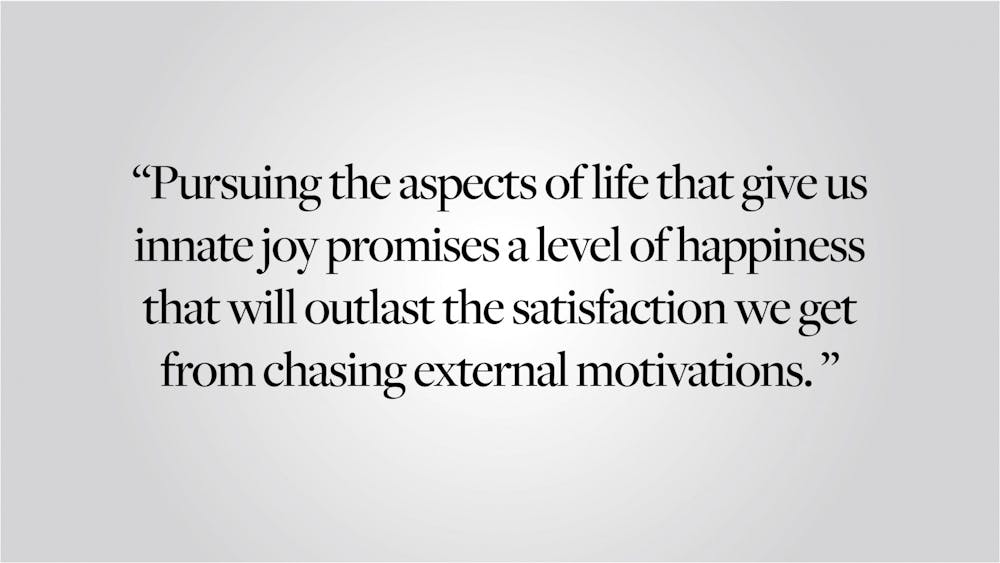A few weeks ago, I bombed a job interview. An hour before my call, I found out tree cutters would be working directly outside my window. So, I did what any person would do in my situation: I calmly arranged to borrow a friend’s room then sprinted across campus. By the time my interview started, I was sweat-stained, frazzled and fully aware that I wasn’t going to get a call back. After the interview, rather than stressing out about it — as I normally would — I chose to reread David Brooks’s essay “The Moral Peril of Meritocracy,” and until sitting down to write this piece, I haven’t given my catastrophic job interview another thought. While Brooks doesn’t give advice on how to ace a job interview or build a successful career, he provides a grounding and insightful framework for what makes a “good” life — something I’ve given more thought to as my time in college draws to an end.
The full scope of Brooks’s essay is a bit too esoteric to discuss in a column, but I’ve found that the two-mountain framework he outlines is a helpful starting place to reflect on our time in college and our goals for the years to come. Brooks examines what makes a happy life and finds that certain well-lived lives can be distilled into surmounting two mountains. When we climb the first mountain, our motivations are primarily individualistic and egotistical, often overly concerned with personal success and validation. This is a mountain defined by the school you went to and the career you made for yourself. But eventually there comes a breaking point: Often we realize that, even at the summit, we’re unhappy. Climbing the second mountain, then, is a spiritual and empathetic experience, defined by embracing community, acting on behalf of others and pursuing joy. To create a truly happy life, you need to do away with the motivations that propelled you up the first mountain. This framework not only helps us to distinguish what our extrinsic and intrinsic motivations truly are, but it also sheds light on a broader motivational problem underlying American higher education.
Many of us have been taught to view life through the lens of the first mountain. You work hard, get into a prestigious school, secure a good internship and if all things go to plan come senior year, you’ll have a job offer from some fancy company. Meanwhile, the underlying assumption is that through this process you will find happiness, whether that be from the validation you get attending a good school, having a desirable job or making a lot of money. Don’t get me wrong, these are all good things — but they don’t necessarily offer true happiness. This is the trap of the first mountain. Each step is motivated by extrinsic factors, whether that be societal demands or a desire to stroke the ego: A good education is valued by employers, and securing a competitive job does a lot for one’s public image.
This is the issue I have with our academic culture: It places too much emphasis on the successes of this first mountain. The amount of pressure on landing a “good” job and having something to do out of college is mind-boggling. Over the past four years, I can’t tell you how many times I’ve heard people stress about — and have myself stressed about — “interview season” and recruiters coming from McKinsey or J.P. Morgan. Throughout college, a culture that equates the size of one’s bank account with their self-worth conditions us to jump through hoops and climb ladders, to focus on our extrinsic motivations often at the expense of our intrinsic ones. But pursuing the aspects of life that give us innate joy promises a level of happiness that will outlast the satisfaction we get from chasing external motivations. These intrinsic motivations drive us up the second mountain. The beauty is that the object of these motives doesn't need to be ambitious. This past year, I started playing guitar. I’m terrible at it, but I look forward to practicing each day and have found joy in playing with my friends. Whether it be cultivating a new relationship, spending time with family or practicing an instrument for your own enjoyment, the happiness we get from these pursuits exists even without society’s external validations.
Of course, that’s not to say don’t get a job. The reality of life is that we are torn between following extrinsic and intrinsic motivations. Some of us do not have the freedom to pursue our wildest desires at the expense of securing a stable salary. But all of us can work to identify the aspects of life that make us truly happy and pursue them in whatever capacity we are capable of. For me, for example, it was easy to get over my failed job interview once I realized my motivations were extrinsic. I had interviewed for a consulting company to pursue a career I only heard about in college and whose main appeal for me was the salary — I had no innate desire to do that type of work. I had fully succumbed to this “first mountain” mindset and overlooked the fact I was applying to a job I didn’t care about.
So what happens when we apply some of David Brooks’s thinking? What if while leaving college, we place less of an emphasis on the successes of the first mountain and try to identify the things in life that naturally give us joy and will help us summit the second mountain? If you shed the ego, consider your intrinsic motivations, then envision your future career, what do you see? Is your first job out of college still at McKinsey? At least for me, it’s not.





